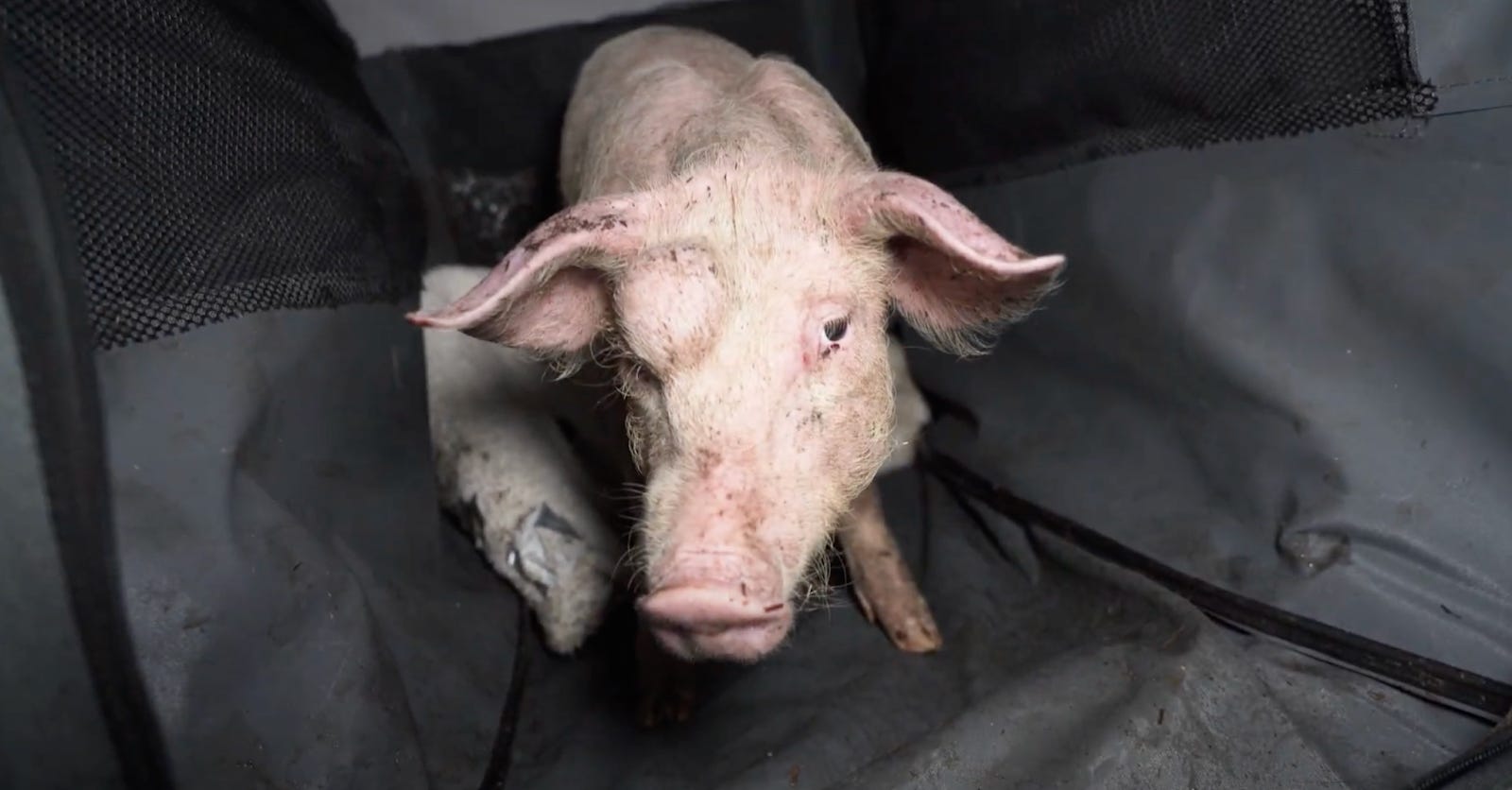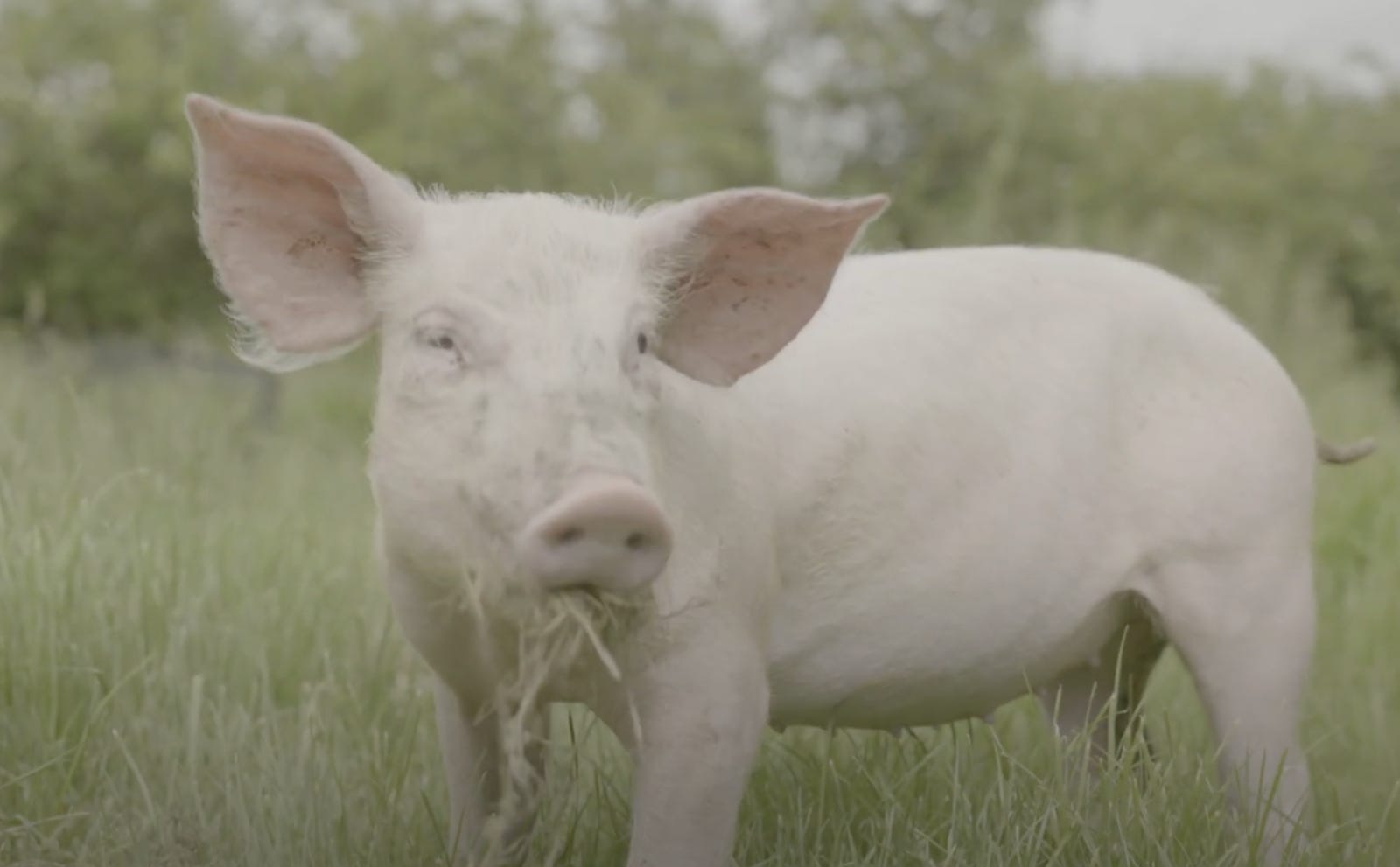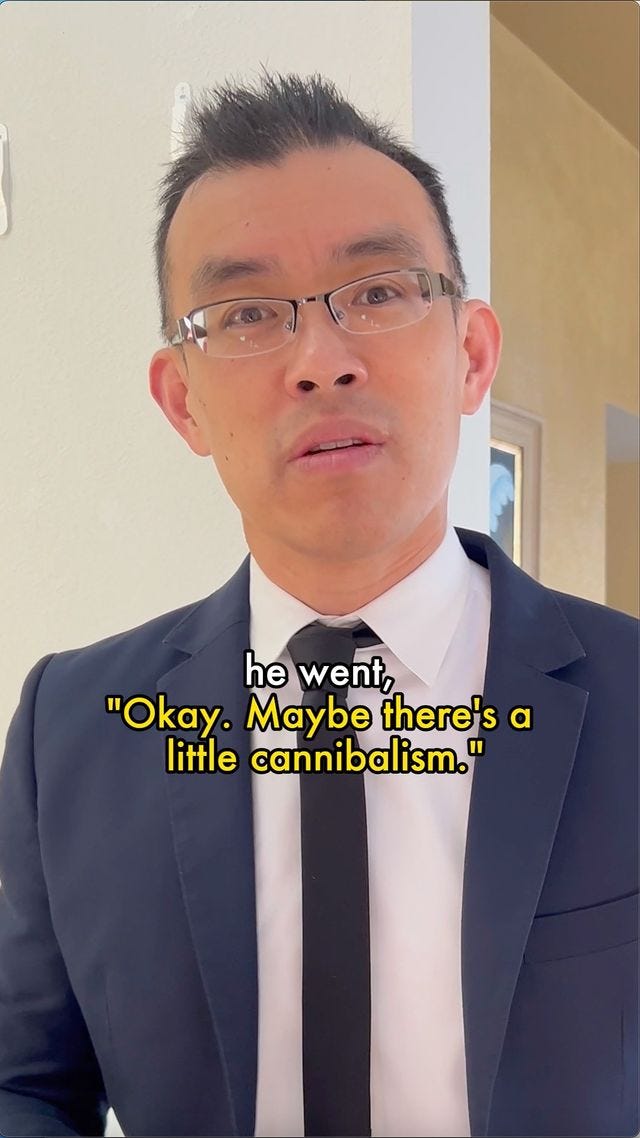|
Why Is The World’s Oldest Animal Charity Endorsing Animal Torture?
Animal Rising's rescue of a piglet from an RSPCA Assured farm illustrates a deeper problem: the lack of vision in the movement for animal rights.
The pain in Charlie’s head was unbearable.
The abscess was the size of a tennis ball, and it was putting pressure on her right eye. Without treatment, she might soon go half blind. That was as good as a death sentence in her crowded and filthy pen. Even if a worker did not smash her skull with a captive bolt gun – the most common method of dealing with injured piglets in modern farms – she would not survive much longer. A piglet who cannot see also cannot fight for food and water. In the harsh environment of commercial pig production, where feed is strictly limited, that meant that Charlie might very well starve to death.
But to the RSPCA, Charlie’s life was certified as “higher welfare.” And the failure of the RSPCA’s Assured scheme points to a more fundamental question:
Why do animal lovers so often endorse animal torture?
The UK-based RSPCA is the oldest animal welfare organization in the world, dating back to 1824. It is also one of the largest with £151.7m ($192 million) in revenue from 2021 (compared to PETA’s revenue of $68 million in that same year). And for the last few decades, it has invested millions of pounds – and the credibility of its name – in its Assured scheme, which certifies the welfare of animals in commercial farms. Among the promises made by the program include “Enriched Living Conditions,” “More Living Space” and “Humane Slaughter” (which, to the RSPCA, includes gassing animals or electrocuting them with “a large pair of tongs.”) Perhaps most important, the Assured program forbids the use of intensive production, i.e., factory farms. Their website states that they “do not allow factory farming” and “strongly oppose intensive farming practices.”
But over the last 4 months, the animal rights organization Animal Rising (AR) visited 45 farms certified by the RSPCA and found that virtually every farm in the Assured program was violating not just the RSPCA’s standards, but animal cruelty laws. AR’s investigative video is must-see for anyone concerned about animals and shows that the RSPCA’s program has become, in the words of one expert lawyer, “effectively fraud.” (Read the full written report here.)
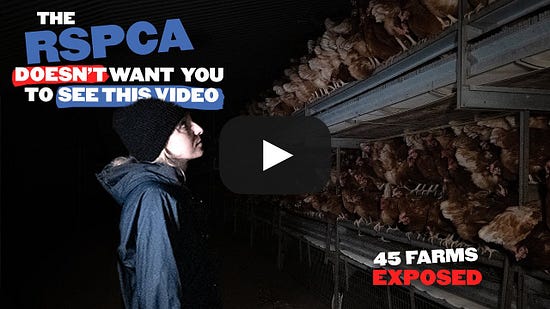
The most obvious proof of this fraud comes from the farms’ own statements to the government. A majority of the RSPCA Assured facilities – some of which had 60,000+ animals in a single shed – applied for permits from the UK’s Department for Environment, Food & Rural Affairs (DEFRA) to engage in intensive farming, despite the fact that intensive farming was supposedly banned by the program. It’s as if the RSPCA inspectors just forgot to ask the companies if they were factory farms.
But the violation of the RSPCA’s intensive farming ban was just the tip of the iceberg. A team of 50+ AR investigators documented a series of abuses at RSPCA Assured farms, including a decapitated bird hanging from the ceiling of a farm; a crippled pig collapsed in a pool of feces; and live salmon in festering cages where sea lice had eaten away chunks of their heads. An animal law expert documented 280 violations in the footage AR shot. The scenes shown in AR’s investigation look more like a horror movie, not the work of an animal welfare nonprofit.
Charlie’s life is one example. Animals who are suffering from injuries such as hers are required, under the RSPCA’s standards, to be “segregated” and “treated without delay.” But Charlie was left to languish in a crowded pen as her infected wound swelled to a monstrous size. Denied treatment, Charlie would have slowly suffered to death.
But Charlie was saved. Animal Rising’s Dan Kidby (who I recently had on my new YouTube show and podcast) and Orla Coghlan whisked her to receive emergency medical care. And the heartwarming scene of a recuperating Charlie, digging through grass and dirt under the sun, shows what the RSPCA should be doing: rescuing animals, not certifying their slaughter.
And yet the RSPCA bizarrely continues to support slaughter, not rescue. Its own President, Chris Packham, acknowledged that the footage from the investigation made him feel “sick” and was “indefensible” animal cruelty. But the RSPCA nonetheless issued a statement to the Sunday Times in response to the investigation that its Assured program has been “independently proven to make lives better for millions of animals every year.” (The RSPCA failed to provide this “independent proof” to the Times.) In other words, the RSPCA attempted to defend what its own President described as “indefensible.”
The RSPCA is not the only example, however, of animal lovers endorsing animal torture. Eighty percent of Americans say that farm animal cruelty is a personal moral concern, yet 99% financially support practices that The New York Times editorial page has described as “torture.” Just as bizarrely, 75% of Americans claim that their meat comes from humane sources, though virtually all animal products come from factory farms. Even prominent vegan journalists, such as Dylan Matthews at Vox, have engaged in Pollyannaish thinking about animal agriculture. For years, Matthews has touted the benefits of cage-free egg farms without acknowledging a major problem: mass cannibalism.
Why would the RSPCA and other animal lovers continue to endorse these animal welfare programs in the face of seemingly incontrovertible evidence of animal torture?
The most cynical explanation is that animal welfare programs, even if false, generate revenue for those involved. In 2021, the RSPCA earned over £4.5 million from membership and licensing fees charged to factory farms and food retailers. Among the many companies that use the RSPCA Assured logo include the largest corporations in the word, such as Tesco and McDonald’s. Scrapping the program would threaten relationships with these food giants – and the enormous financial resources they bring to the table.
A more charitable explanation is that animal advocates don’t want perfection to be the enemy of progress. I have been convinced by Lewis Bollard at the Open Philanthropy Project, for example, that cage-free egg farms are making improvements in animal welfare despite initial increases in mortality due to cannibalism. The animal advocates who endorse animal welfare programs, such as Bollard or Vox’s Dylan Matthews, don’t claim that they are perfect but, rather, that they are better than the status quo. Perhaps the RSPCA feels the same about its Assured scheme, despite the numerous violations.
Another explanation focuses on gaps in enforcement. Annie Lowrey at The Atlantic and Jessica Scott-Reid at Vox have done some of the best reporting on the failure to hold farms accountable to animal welfare standards, leading to disturbing scenes such as “organic” dairy cows sent to slaughter with horrific conditions such as “cancer eye.”
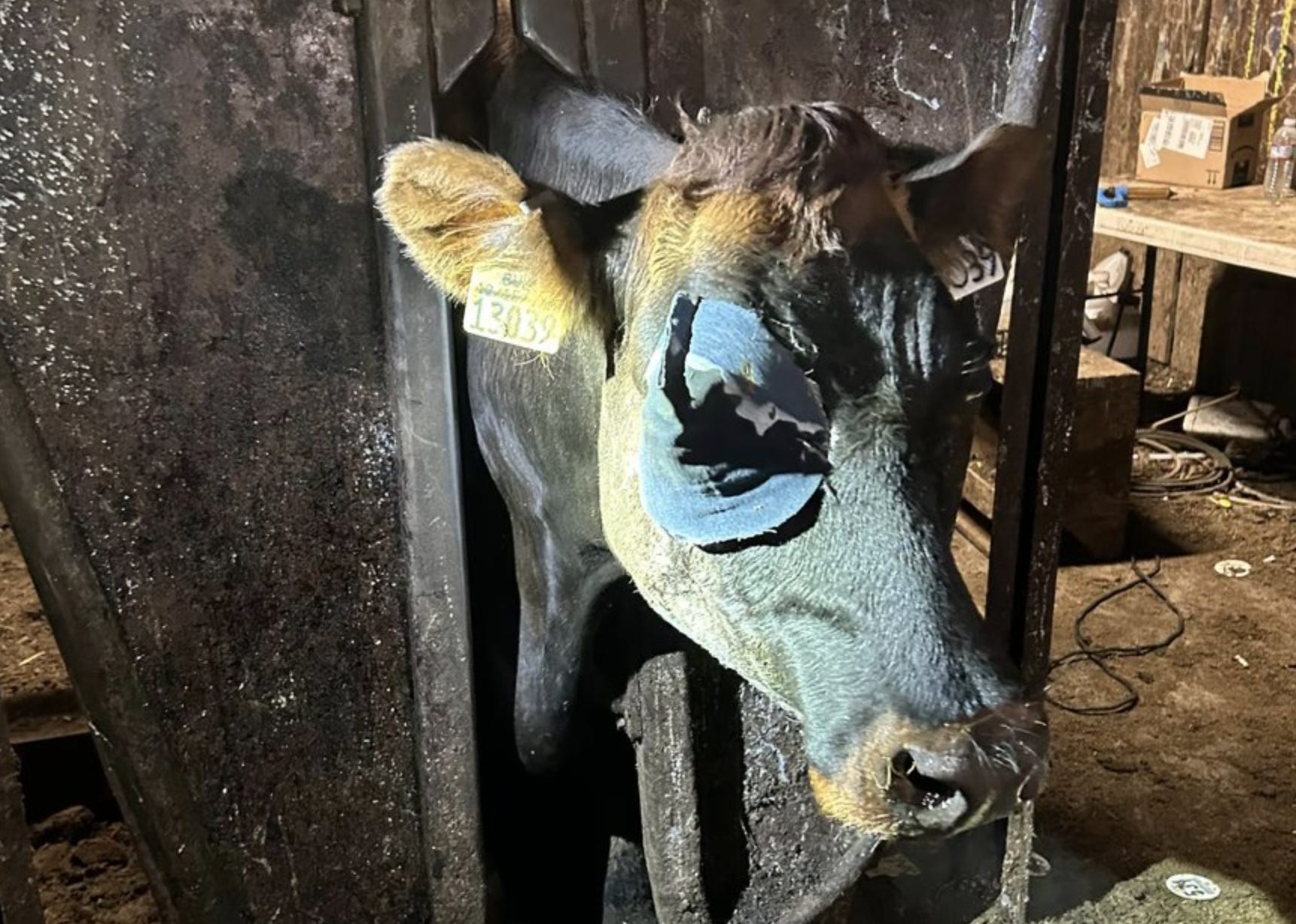 |
The RSPCA’s program is an example of this abject failure in accountability, as it undertakes only a single visit each year to certify its farms – and this visit is pre-scheduled. Perhaps the RSPCA should be putting more, and not less, money into the Assured program to ensure that its standards are actually met. (Check out my conversation with Jessica Scott-Reid to understand why I’m skeptical this will actually work.)

But the most important explanation is the lack of a bigger vision. The animal advocates at the RSPCA, and others who endorse flawed certifications, often doubt our ability to inspire the public to support bigger change. People who have no hope can’t ask for much. But this hopelessness is unwarranted. A majority of the public already supports dramatic changes to protect farm animals, including an outright ban on factory farms and slaughterhouses. And the greatest movements in history have not been afraid to dream big, even if their dreams seem difficult to achieve. (Indeed, meta-studies of goal-setting show that more difficult goals lead to greater progress.)
What you find, when you start dreaming big, is that oftentimes our dreams are not nearly as hard to achieve as they first seem. I found that to be true the first time I walked into a slaughterhouse. It was shockingly easy to enter and rescue an animal, and since that day I have personally carried hundreds of animals from the brink of death - and reached millions of people with stories of rescue. It has only cost me 38 days in jail.
Animal Rising shows us that same vision with their rescue of Charlie. We don’t need to beg for bigger cages or better deaths. We can walk right into violent places and give the animals, as Dan puts it in AR’s video, the lives they truly deserve. Charlie’s life proves this. Now we just need to give to all the other animals what Dan and Orla gave to Charlie: a world that is safe, happy, and free.
Thank you for reading The Simple Heart! To help us reach more people, become a donor today.
